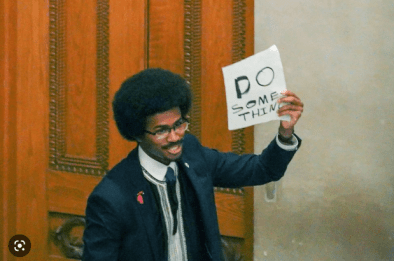
If we have been in the midst of a Third Reconstruction, as historian Peniel Joseph has argued, then the expulsion today of two Black lawmakers from the Tennessee state legislature is an attempt at a Third Redemption.
A Republican supermajority expelled two Black Democratic lawmakers from their seats for joining a protest calling for action on gun violence on the House floor last week in response to the Covenant elementary school shooting that killed six people, three of whom were 9-year-olds. Representatives Justin Jones of Nashville, Justin Pearson of Memphis, and Gloria Johnson of Knoxville – known as the Tennessee Three – were all threatened with expulsion. Johnson, who is white, was not expelled.

The dismantling of democracy at the end of the 19th Century was achieved through bloody campaigns of violence and terror in the former Confederacy. But public support for the reassertion of white planter rule in both the south and the north was achieved through popular depictions of state legislatures as sites of Black chaos and corruption. Take for instance this 1874 cartoon by editorial cartoonist Thomas Nast for Harper’s Weekly, “Colored Rule in the Reconstructed (?) State.” In the foreground we see Black legislators shouting and waving their fists. Behind them is the figure of Columbia telling them, “You are aping the lowest whites. If you disgrace your race this way you had better take back seats.”
Nast was renowned for his popular illustrations supporting the Union in the Civil War (Lincoln called him “our best recruiting sergeant”), and he was a strong opponent of the anti-Reconstruction policy of President Andrew Johnson. Yet even for him, the practice of actual multiracial democracy collapsed into racist caricature, as it did for so many northern whites.

This image became increasingly popular in the last decades of the 19th Century and was solidified in white public consciousness by the time D.W. Griffith’s The Birth of a Nation was released in 1915, where Black(face) lawmakers are depicted as lazy and drunken, eating chicken and putting their feet up on desks in the Reconstruction South Carolina legislature.
The reactionary dread of a multiracial democracy has never died, and in fact came back with a vengeance for the more than 70 million Americans who believed that they had been robbed of their sovereignty in the 2020 elections by the heavily Black and brown election districts in Pennsylvania, Georgia, Wisconsin, Michigan, and Arizona. That, of course, led to the January 6, 2021 assault on the U.S. Capitol.
Astonishingly, or perhaps not so much, Tennessee House Speaker Cameron Sexton compared the actions of Jones, Pearson, and Johnson to the January 6th insurgents. In making the comparison projected both the violence and anti-democratic impulses of his own party onto the Tennessee Three. But the Republican attempt to deny democracy in the name of civility has underscored the crucial difference between the two.
Responding to his expulsion on the floor of the Tennessee Statehouse, Justin Jones powerfully expressed the generous, capacious essence of collective self-rule. “You have the votes to do what you’re going to do today,” He told his erstwhile colleagues, “But I want to let you know that when I came to this well I was fighting for your children and grandchildren too.” He went on, “When I walked up to this well last Thursday, I was thinking about the thousands of students who were outside demanding that we do something, in fact many of their signs said, do something, do something, do something . . . We were calling for a ban on assault weapons and the response of this body is to assault democracy.”
And in an exchange with GOP Rep. Andrew Farmer, Justin Pearson sharply contrasted authoritarian notions of civility with democratic decency. Hoping to infantilize the lawmakers he was voting to expel, Rep. Farmer scolded Pearson, saying, “That’s why you’re standing there. For that temper tantrum that day. For that yearning for attention. Well you’re gettin’ it now.”

In response, Pearson exposed both the racist and anti-democratic core of Farmer’s attempt at humiliation. Looking around the House floor Pearson asked, “How many of you would want to be spoken to that way? The reason, I believe, the sponsor of this resolution spoke that way is because he’s comfortable doing it. Because there’s a decorum that allows it. There’s a decorum that allows you to belittle people. We didn’t belittle nobody. What we said was that we cannot be beholden to the gun lobby or the NRA . . . But there is something in the decorum of this body that makes it okay to say that folks who are exercising their First Amendment rights to speak out for the hundreds of thousands of people collectively that we represent, there’s something in the decorum of this body that says it’s okay to call that a temper tantrum. To call people we disagree with on the issues, to say all they wanted was attention.”
Pearson’s words should stand as a reminder that civility is not a natural ally of those who want to defeat authoritaranism. Often enough it is our enemy.
The (likely temporary) expulsions of Jones and Pearson were a defeat for democracy, no doubt. But they were also a victory, for democracy’s deepest principles and purposes were made crystal clear by the thousands of protests outside the statehouse, and by its defenders on the House floor.
Discover more from Joe Lowndes
Subscribe to get the latest posts sent to your email.



